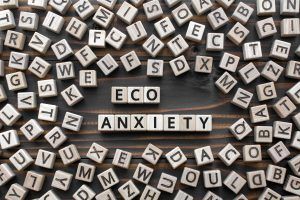Eco-Anxiety
Eco-Anxiety

April is the month that we celebrate Earth Day (April 22) and Stress Awareness Month. These two subjects are not as divergent as you might think. Have you ever heard of eco-anxiety?
Stressful Numbers
According to an article published by Harvard Health Publishing, eco-anxiety or climate anxiety is currently experienced by more than two-thirds of Americans. Defined as a distress related to worries about the effects of climate change, it particularly affects children and young adults. A study in The Lancet found that 84% of 16 to 25 year olds are moderately worried about climate change, and 59% are very or extremely worried. That chronic worry or stress can lead to depression, anxiety, and substance use disorders.
Direct and Indirect
The 100 Year Lifestyle has long been aware of Environmental Stress as related to extreme weather such as the increase in hurricanes and major storm flooding. However, in addition to direct experiences with natural disasters, there are a myriad of indirect ways that people can experience eco-anxiety. Rising temperatures are now being studied as having an impact on the mental health of young people. Additionally, resulting food insecurity has been found to be affecting not only mothers, but their children as young as preschool-aged.
Regain Control
Are you, someone you love, or someone in your community experiencing eco-anxiety? There are steps that can be taken to regain a sense of control.
First, combine your love of nature with your need to de-stress by spending time in nature. The Japanese have long engaged in shinrin-yoku or forest bathing. This process of taking in the forest through your senses involves spending even a small amount of time in nature. That means spending time away from technology. Studies have proven that the health benefits of forest bathing are real.
Americans are becoming increasingly disconnected from nature. However, the conscious act of spending time in nature offers immediate and direct benefits to our physical and mental health.
Network
However, if getting outside isn’t putting a dent in your eco-anxiety, try visiting the Good Grief Network website. Their program “helps individuals and communities build resilience by creating spaces where people can lean into their painful feelings about the state of the world and reorient their lives toward meaningful action.”
Back to Lifestyle
Living a lifestyle based on your values will likely mitigate eco-anxiety. Doing so will also mitigate any other anxiety you might be feeling. That values-based lifestyle will no doubt include holding a vision, making choices, and taking steps based on the health of the planet, the health of your community, and your health.
If you need some help in creating that vision and making those lifestyle choices, there’s a 100 Year Lifestyle provider near you to help! Together we can eliminate eco-anxiety and create healthy longevity for people and the planet!
- SHARE THIS POST


